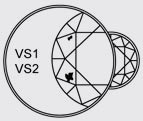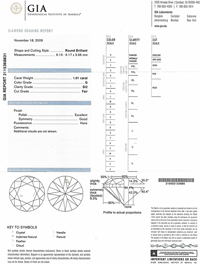Everything you want and need to know about diamonds. An info-packed post...
Much thanks to diamond expert Vadim Weinig, of Seventy Seven Diamonds {77diamonds.com} for sharing his expertise on how to BUY, RESEARCH, and CARE for diamonds. It can be such a daunting subject and I'm impressed by the simplicity in which it is explained. From where to start... to the 4 C's... to making sure you're buying conflict free... Enjoy!
1. Where is a Guy to Start? {Do your homework first- but what is the assignment?}
 The first thing a guy needs to do before he begins his search for the perfect diamond engagement ring is figure out his budget. From there you’ll want to do some research on what gives a diamond its value (the 4 C’s, among other things).
The first thing a guy needs to do before he begins his search for the perfect diamond engagement ring is figure out his budget. From there you’ll want to do some research on what gives a diamond its value (the 4 C’s, among other things).
Once you know how much you want to spend and why some diamonds are more expensive than others, then you can decide on a stone that matches your wallet size to her preferences.
2. Is Bigger Better? Does quality trump size?
Bigger isn’t always better. If you’re on a limited budget and you settle for a lower quality stone in order to get a big rock, you could end up with a dull, yellowish diamond spotted with obvious inclusions. On the other hand, a miniscule diamond of exceptional quality might not be very impressive to the woman of your dreams. It is, however, entirely acceptable to make sacrifices in quality in order to step up the size of the stone.
We recommend purchasing diamonds which are of at least VS1 clarity and F or G in colour. This will ensure that your diamond is eye clean and white. From there you can find a carat weight that matches your budget and your significant other’s preference.
3. Which Questions Does Every Good Fiancé-to-be Ask of the Jeweller?
When considering a jeweller you’ll want ask them what kind of return policy they have. Just in case your future fiancée isn’t quite happy with your choice of engagement ring, make sure they will allow you to replace the goods, exchange them for other items or refund your money.
You’ll also want to make sure that your jeweller is selling diamonds that are certified by a trusted diamond grading lab. Never buy a diamond that does not have a certificate or one that has a certificate from a questionable lab. You’ll need to do a bit of research if your jeweller mentions a lab you are unfamiliar with.
If you are unsure about what exactly your significant other wants for an engagement ring, you should use your jeweller’s expertise to your advantage. Give the jeweller and idea of your girlfriend’s figure and the size of her hands and fingers. Ask them to suggest a style that would suit her.
4. What Exactly are the 4 C’s and WHY you should care
The 4 C’s are the most important attributes of a diamond: cut, clarity, colour, and carat.
Cut refers to how well a diamond is polished from the rough and has the most effect on its sparkle. Clarity will give you an idea of the level of inclusions such as scratches, blemishes, pockets of air and non diamond material inside or on the surface of the diamond. Colour stands for how white or colourless a diamond is. Carat is a measurement of the weight of a stone and will give you an indication of the size of the diamond.
You should care about the 4 C’s because they will have the most impact on the value, price, and beauty of your diamond.
5. Is There Such a Thing as a Perfect Diamond?
 Ultimately, the perfect diamond is really a matter of opinion. The importance of some diamond attributes is based on personal preference, such as shape and carat. Still, in terms of clarity, cut and colour, you could say that there is such thing as a perfect diamond. When it comes to diamond grading, a perfect diamond would be one that has the top grade for all of its attributes.
Ultimately, the perfect diamond is really a matter of opinion. The importance of some diamond attributes is based on personal preference, such as shape and carat. Still, in terms of clarity, cut and colour, you could say that there is such thing as a perfect diamond. When it comes to diamond grading, a perfect diamond would be one that has the top grade for all of its attributes.
Most diamonds have flaws, or impurities, but there are some diamonds that are flawless (graded FL) and these are extremely rare. It is also equally rare to find a completely colourless diamond (graded D). Cut, which determines a diamond’s sparkle, is difficult to judge for fancy shapes. Not all grading labs actually grade cut and the ones that do have different grades. However, in round diamonds cut has been perfected down to a science. There’s a good reason why a flawless, D colour diamond with a top grade in cut command a seriously high premium.
6. How Can You Tell a Good Jeweller from a Bad Jeweller?
The first tell tale sign of a bad jeweller is one who either does not sell certified diamonds or sells diamonds with certificates from questionable labs. Avoid these places at all costs.
The easiest way to tell a bad jeweller from a good jeweller is with the level of customer service they provide and the way they handle problems. Every jeweller has come across an issue such as losing a ring or chipping a stone, but it’s the service they provide that matters. A good jeweller cares more about the customer than their money. When there is an issue with your jewelery, a good jeweller should always be willing to either offer you a solution or a refund. A bad jeweller will make excuses and give you a hard time.
7. How Can You Tell a Good Diamond from a Flawed One?
 As we said before, a perfect diamond is ultimately a matter of preference; however there are some diamonds that you should just avoid. No woman wants an obviously yellow tinted diamond with a glaring inclusion, so for this reason you should always make sure that the diamond you purchase is eye clean and at least G colour.
As we said before, a perfect diamond is ultimately a matter of preference; however there are some diamonds that you should just avoid. No woman wants an obviously yellow tinted diamond with a glaring inclusion, so for this reason you should always make sure that the diamond you purchase is eye clean and at least G colour.
It can be difficult to know if your diamond is eye clean from a grading report, as some labs will grade more or less harshly. If you want to ensure your diamond is eye clean then purchase one with VS1 clarity or above. You can go lower than this and still get an eye clean diamond, but just make sure you ask your jeweller to confirm it is actually eye clean if you aren’t able to see it yourself before buying it.
8. What is the Best Way to Buy a Diamond?
The best way to buy a diamond is to first do your research! You don’t need to become a diamond expert, but make sure you at least learn about the 4 C’s and how they affect the value of a stone. You’ll want to decide on which diamond attributes are the most important to you and your loved one, however, try not to sacrifice quality in one area to get higher quality in another. It’s best to keep your diamond balanced. From there you can start shopping around for prices on diamonds with your chosen specifications.
9. What is this Talk about Having a Diamond Certificate?
 Having a diamond grading certificate from a trusted laboratory is almost as important as the as the quality of the diamond. A certificate verifies a diamond’s attributes as measured by experts, using expert equipment.
Having a diamond grading certificate from a trusted laboratory is almost as important as the as the quality of the diamond. A certificate verifies a diamond’s attributes as measured by experts, using expert equipment.
Different labs can produce different reports for the same diamond, but usually the difference is only by one grade. Because anyone can call themselves a diamond grading lab and produce a certificate it is important that you do your homework and make sure that you are getting a certificate from a trusted, legitimate lab. Some of the largest and most trusted labs are GIA, AGS, HRD, IGI, and EGL.
10. How Do You Care for a Diamond Once it is Yours?
Although diamonds are one of the hardest natural materials known, they are still susceptible to scratching, chipping, and cracking. You should have your diamond jewellery and engagement rings checked by a jeweller at least once a year. This will ensure that the prongs and mounting are holding the diamond tightly in place. Try not to wear any diamond jewellery when doing physical exercise and store it in its own spot. This will prevent the diamond from getting scratched.
You should also have your diamond jewellery professionally cleaned once or twice a year. Ultra-sonic cleaning is fine and is usually free of charge. However, full professional cleaning and re-polishing is not recommended on a frequent basis. If your diamond gets dirty from everyday wear, you can also clean it at home yourself. Just soak the diamond in warm water with a mild liquid detergent and gently clean it with a soft bristled toothbrush.
11. How Can You Make Sure You’re Not Buying Conflict {blood diamonds}? What Questions Do You Need to Ask?
The Kimberley Process Certification Scheme was created as a way to prevent the trade of conflict diamonds in the diamond market. The scheme outlines rules which govern the trade of rough diamonds to ensure that they are conflict-free. The Kimberley Process does not certify individual jewellers, but any jeweller who only works with manufacturers that are compliant with the Kimberley Process should have this statement on their invoice:
"The diamonds herein invoiced have been purchased from legitimate sources not involved in funding conflict and in compliance with United Nations Resolutions. The undersigned hereby guarantees that these diamonds are conflict free, based on personal knowledge and/or written guarantees provided by the supplier of these diamonds."
Any reputable business that is compliant with Kimberley Process standards should be able to answer these questions:
- How can I be sure your jewellery does not contain conflict diamonds?
- Do your diamond suppliers participate in the industry’s ‘System of Warranties’*?
- Can I see a copy of your company’s policy on conflict diamonds?
Thanks again Mr. Weinig for sharing your expertise with us! With such valuable info, please feel free to.... print and share this post.
Seventy Seven Diamonds is a London-based jeweller that specializes in engagement rings and diamond jewelry. They have a terrific website and an interesting blog. To learn more about this company, you can check them out here.
 by:
by: 


